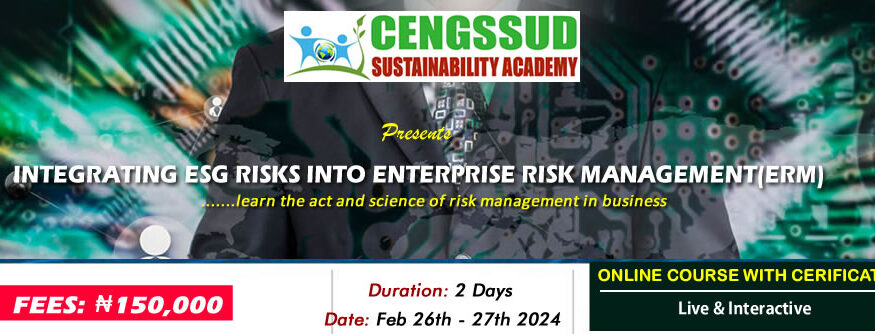COURSE OVERVIEW
This Masterclass addresses an increasing need for companies to integrate environmental, social, and governance-related risks (ESG) into their Enterprise Risk Management processes.
ESG offers a new way of looking at risk that is broader than a traditional enterprise risk management (ERM) framework. By looking beyond economic, strategic, and operational factors to include social, environmental, and governance considerations, ESG allows corporations to consider emerging risk areas and to look for opportunities presented by risks that are overlooked by other analytical and systems-driven approaches.
Sustainability, coupled with traditional risk identification and analysis tools, gives risk managers the information they need to make better, more informed decisions on an array of risks, including environmental, social, economic, operational, and strategic issues. A risk management approach that incorporates sustainability provides management with useful data for identifying emerging issues and developing new and better products and processes that help protect corporate reputation and improve stakeholders’ value.
In this course, we shall explore how to use sustainability as a platform for risk management, supplementing traditional risk management techniques, and improving responses to all areas of risk. We shall teach you how sustainability can incorporate Enterprise Risk Management (ERM) techniques and highlight the benefits of considering a broader spectrum of risks and searching for opportunities that are derived from the process of identifying and analyzing risks from all aspects of the organization’s operations and activities etc.
From this Masterclass risk, participants will
- Participants will understand the concept of ESG and its importance to business
- structure an ESG risk assessment
- integrate ESG risks within the enterprise risk framework
- perform a deep dive into ESG in the context of Operational and Reputational risks
- comply with current regulatory frameworks
- Define sustainable enterprise risk management
- Identify the roles and responsibilities within an organization to implement sustainability in enterprise risk management as an enterprise-wide function
- Understand the gap in risk and sustainability disclosures and how to address this
- Understand and conduct quantitative Sustainable Risk Analysis
- Learn how to implement a thriving/sound sustainable enterprise risk management program in an organization
- Understand how to monitor, report and evaluate a sustainable enterprise risk management program for improvement
WHO WILL ATTEND?
- C-Level Executives, Risk, audit, and compliance, Sustainability & ESG practitioners, Analysts, investment officers, Quality Assurance, Financial management, Business Development, continuity, Sales and Marketing, Policy Makers, Investors, Strategic planners, Procurement and sourcing, Operations and logistics, Human Resources, Supervisors, Senior executives, Board directors, Regulators and rating agency analysts, Internal and external auditors, Investment professionals, Business managers, Business continuity coordinators, Business operations managers, Disaster recovery professionals, Corporate strategy staff, Asset liability management professionals, Anyone new to ERM within financial services.
COURSE AGENDA
Module 1: ESG Risks and Opportunities: Understanding the ESG Landscape
- What are ESG-related risks?
- Why do environmental, social and governance-related risks matter for organizations?
- Comparing ESG disclosures to risk disclosures
- COSO’s Enterprise Risk Management Framework
- Scope of ESG-related risks
- How can Sustainability help Enterprise risk management navigate ESG-related risks?
- Navigating ESG issues — performing an ESG materiality assessment
Module 2: Governance and Culture for ESG-related Risks
- Oversight and governance for ESG
- Responsibilities to manage ESG-related risk
- Embedding ESG awareness in the entity’s culture
- ESG at the board level
- ESG at the management level
Module 3: Strategy and objective-setting for ESG-related risks
- Value creation and the business model
- ESG-related risk considerations to understand the complete business context
- The concept of materiality and leveraging the entity’s ESG materiality assessment
- Stakeholder engagement
- Alignment to strategy and business objectives
- Risk appetite
- Evaluating alternative strategies and formulating business objectives
Module 4: Performance for ESG-related risks
- Identifying risks and their Approaches
- Using a risk inventory
- Framing risks
- Assessing and prioritizing risks
- Implements risk responses
- Review and revision for ESG-related risks
- Review ERM activities to respond to change
- Information, communication and reporting for ESG-related risks
MODULE 5: Enterprise Risk Management Framework
- COSO’s Enterprise Risk Management Framework
- Assessing company readiness for ESG-related risks
- Alignment of sustainability risk appetite to the organization’s corporate strategy and the new world view of company value
- Integrating sustainability to better manage enterprise risk
- Applying a Sustainability Lens to COSO’s Objectives Categories:
- Strategic Risks
- Operational Risks
- Compliance Risks
- Reporting Risks.
MODULE 6: Integrating Sustainability into the Components of the COSO Enterprise Risk Management (ERM) Framework
- Internal Environment
- Objective Setting
- Event (Risk) Identification
- Risk Assessment
- Control Activities
- Risk Response
- Information and Communication
- Monitoring
- Conclusion: Managing Risk for a Sustainable Future
- ESG in ERM
February 26, 2024 - February 27, 2024
10:00 am - 5:00 pm

